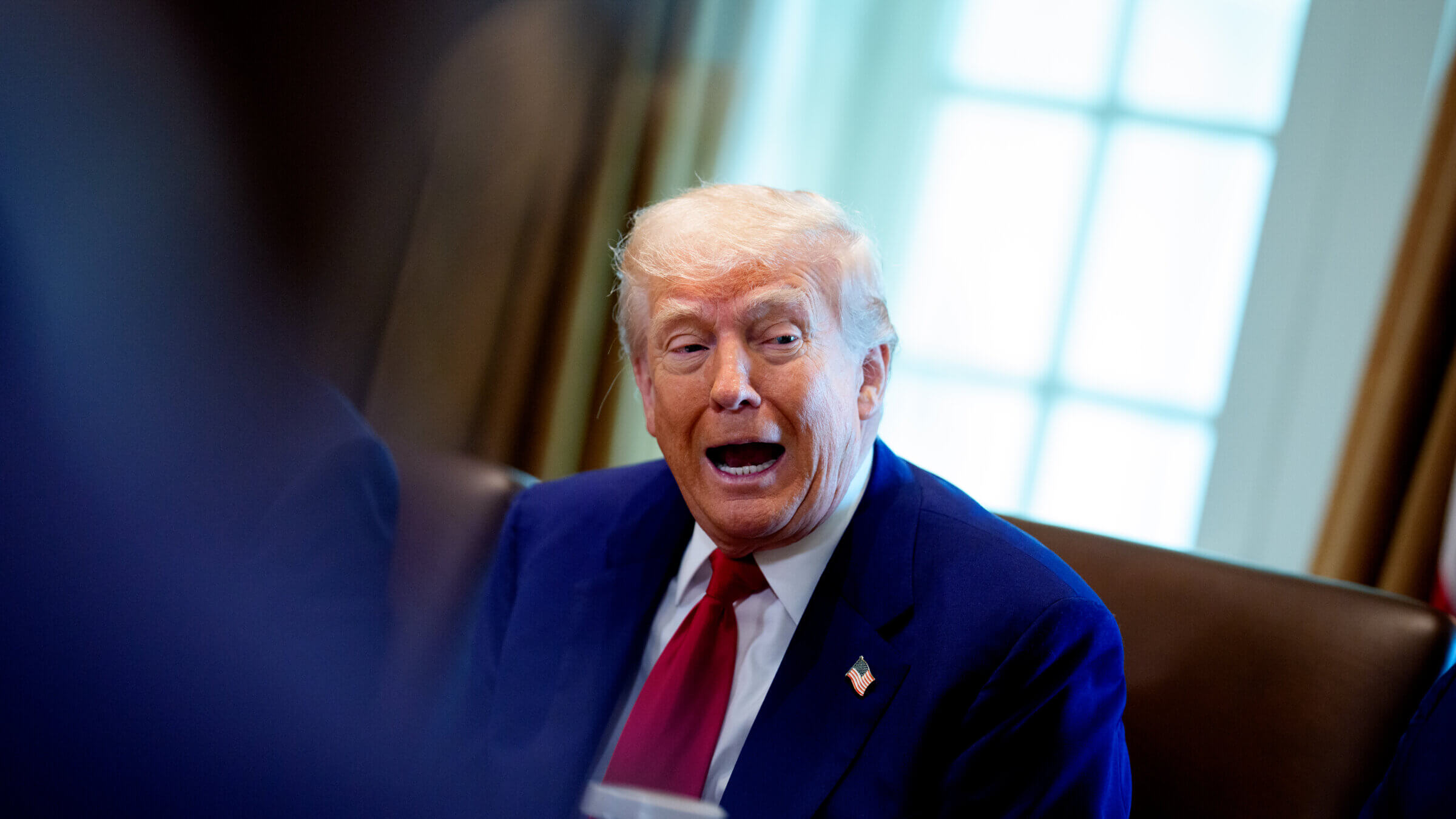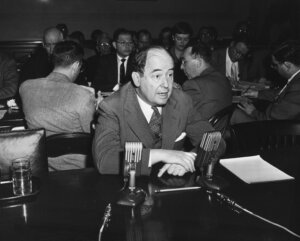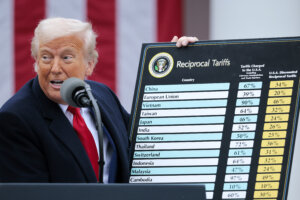This Jewish mathematician understood why Trump is a terrible poker player
John von Neumann co-authored a theory of games, which explains a lot about the president’s approach to economics

Donald Trump speaks about tariffs during a Cabinet meeting at the White House. Photo by Getty. Images
This year marks the 70th anniversary of the dropping of the atomic bombs on Hiroshima and Nagasaki. One of the key figures behind this world-shattering event was the mathematician and physicist John Von Neumann, a member of the Manhattan Project. Though his name might not be familiar, we live in a world that he helped shape.
This is in part due to another work of his, published a year earlier in 1944, that has had an impact nearly as great but far more positive than the bombs: namely the Theory of Games and Economic Behavior, the book he co-authored with the German-American mathematical economist Oskar Morgenstern. This forbidding work — more than 600 pages of equations and charts — has transformed the landscapes of fields ranging from computer technology through nuclear deterrence policy to economic forecasting.
It also revealed what makes for great poker players — a subject that is now very much in the news.
As traumatized Americans, and most of humankind will recall, it was only last month that our president declared “Liberation Day” for our country. By way of illustrating his proclamation, Trump held up a chart listing the “reciprocal tariffs” he had decided to impose on the world’s countries. Think of it as the economic version of atomic fusion, one in which two elements — the power of the presidency and the obsession of its officeholder with a single idea — combine to create an exothermic event.
In this instance, though, it is not a world-shattering explosion of the hydrogen bomb, yet another work to which von Neumann contributed. Instead, it has been the implosion of the global economy. For the past month, the world has been reeling from Trump’s handling of tariffs, at one moment imposing them and the next delaying them, at another moment increasing them and the next decreasing them. It is never healthy, Harvard professor of economics N. Gregory Mankiw (and former advisor to George W. Bush) drily noted, “for people to think the president on any given day is going to completely upend a set of economic arrangements.”
Of course, many of us still find it unthinkable to have a president who rarely thinks. Such presidents require straight-faced officials to insist, against all evidence, that not only does their boss think, but thinks at the level of five-dimensional chess. This is why Treasury Secretary Scott Bessent, as Liberation Day seemed to be morphing into Armageddon Day, scrambled to news studios to reassure Americans that President Trump knew exactly what he was doing.

And what, precisely, was that? The answer, murmured Bessent, was “strategic uncertainty.” With the patience of an elementary school teacher explaining the mystery of addition and subtraction, Bessent told an ABC News interviewer that Trump was, in essence, keeping our country’s opponents guessing. “You’re not going to tell the person on the other side of the negotiation where you’re going to end up.”
That is unless one’s opponents, which include all of one’s traditional allies as well as islands where only penguins live, already know — including the penguins — where you are going to end up.
This is where John von Neumann comes in, much to his annoyance if he were still alive. Born into a well-to-do Jewish family in Budapest at the turn of the 20th century, Neumann was a prodigy, equally adept as a child at learning languages as at mastering mathematics. By 1930, when he converted to Catholicism, he was already recognized as a brilliant mathematician — so much so that, three years later, he received a job offer from the Institute of Advanced Study in Princeton, New Jersey. He went on to participate in the Manhattan Project, advise Democratic and Republican governments, lay the foundations for such inventions as computers and quantum physics, and recount off-color Yiddish jokes at cocktail parties and math seminars.
And, of course, von Neumann was the co-author of the Theory of Games and Economic Behavior. In this 600-plus page work of proofs and theorems is a section titled “Poker and Bluffing.” There is no need, however, to wrestle with the mathematical equations which pepper the section. Instead, we can turn to a conversation that Jacob Bronowski, the Polish-born British mathematician best known for his remarkable BBC series The Ascent of Man, had with Von Neumann during the war.
Sitting together in a taxi, von Neumann told Bronowski that there are games and games. Take chess, which turns out to not be a game at all. Instead, von Neumann explained, chess is little more than a form of computation, where there is, by definition, always a right move and desired solution. But real games, he continued, are not like that at all. “Real life consists of bluffing, of little tactics, of asking yourself: what is the other man going to do? And that’s what games are about.”
Poker, unlike chess regardless of the number of dimensions, is a real game. Von Neumann, according to his biographer Norman Macrae, was something of a loser at poker. Not because he was bemused by the game, but instead he was bored. So much so that he often lost himself in mathematical problems while holding his cards.

Trump, it turns out, is also bad at poker. In fact, he is as bad at this game as he was in running casinos where it was played. Good poker players learn from experience how to anticipate the moves of other players seated at the table. As the Yale economist Stephen Roach recently wrote, games like poker do not “end at the boundary of a single interaction. Repeated play — across time, administrations, and crises — fundamentally shapes strategy.”
Though their learning curve was sudden and steep with Trump, world leaders now see the Trump administration, in Roach’s phrase, as a “player with a high defection probability and no payoff function.” In other words, they have learned that the administration’s bluffs are rarely followed by sustained action, that its actions are quickly reversed, and that the concessions it does obtain lead only to further escalation, not resolution. (See: elite law firms and elite universities.)
In a word, they have learned to play Trump. But this is perhaps not as reassuring as we might wish. The fear is that, once he discovers others see him as a chump, Trump will upset the table in a fit of pique. But this would not surprise von Neumann, who was at heart a pessimist about the human condition. As he once remarked, “It is just as foolish to complain that people are selfish and treacherous as it is to complain that the magnetic field does not increase unless the electric field has a curl. Both are laws of nature.”

















